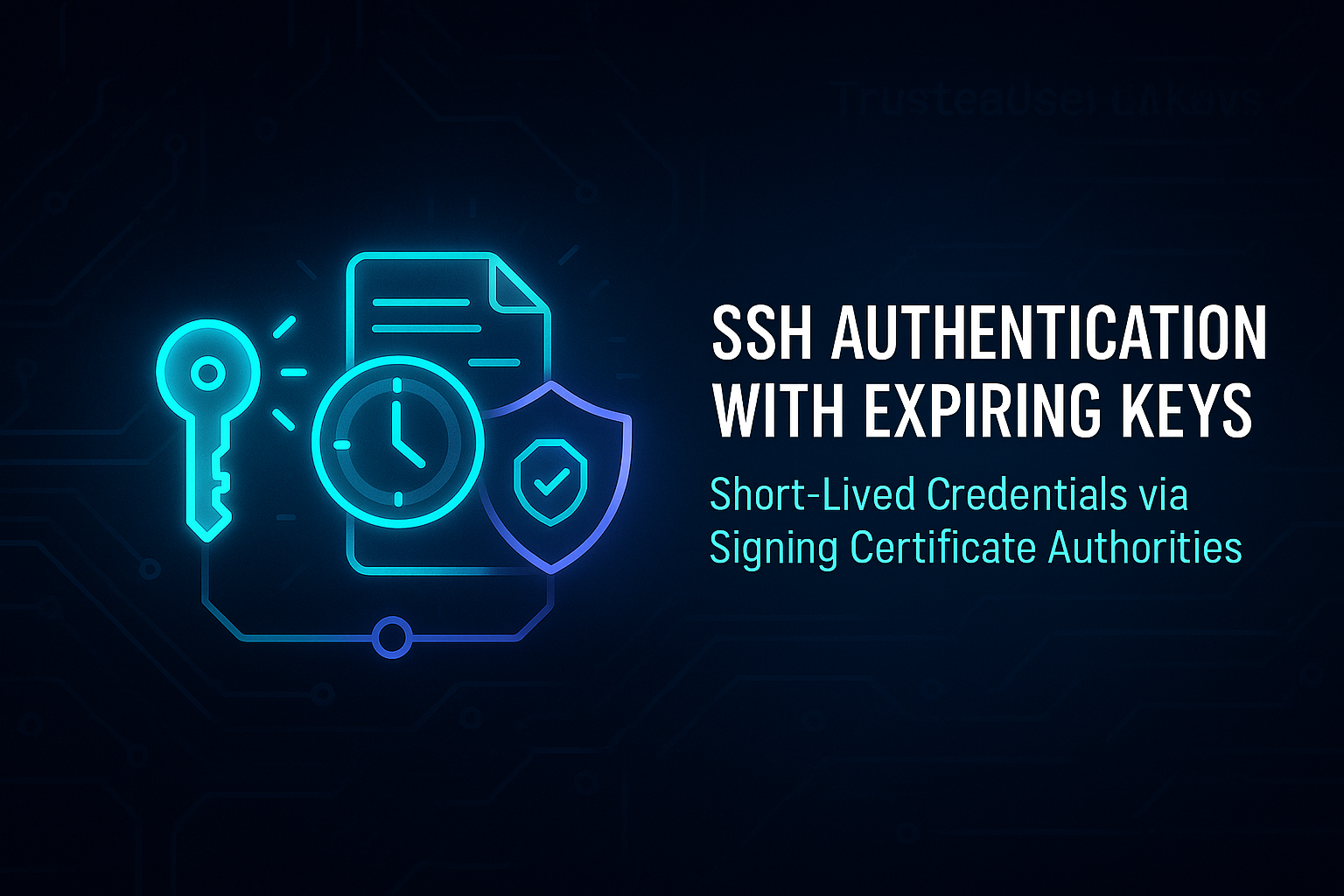Stop Reusing Old SSH Keys How to Use a Signing CA for Expiring SSH Auth
Introduction to SSH Authentication Keys
SSH keys are simple to create and are usually one of the first tools Linux administrators learn to use. They provide a secure, passwordless method to access remote servers by pairing a private key on the local machine with a public key stored on the server. However, a key limitation is that traditional SSH keys, generated using tools like ssh-keygen, do not expire. If a private key is compromised, an attacker could gain persistent access to any server where the public key is authorized. This makes it important to find ways to limit the lifespan of SSH keys to reduce potential security risks.
Table of Contents
- Introduction to SSH Authentication Keys
- Security Issues with SSH Authentication
- Why Use Expiring SSH Keys?
- Just in Time (JIT) Logins for SSH
- Conclusion
What is a Signing CA for SSH?
A Signing Certificate Authority (CA) is a trusted entity that can sign SSH public keys to create short-lived certificates. Instead of relying solely on static public keys, the SSH server trusts the CA to vouch for a user’s identity for a limited time. These signed certificates allow administrators to enforce expiration dates on SSH access, ensuring that keys cannot be used indefinitely. By implementing a Signing CA, organizations gain more control over SSH key management, enabling practices like short-lived access, automatic key expiration, and Just-in-Time (JIT) credentials without changing the underlying public keys on the servers.
Creating Expiring SSH Keys with a Signing CA
Step 1: Create a Signing CA Key
To introduce expiration dates for SSH keys, you first need to create an OpenSSH key to act as a Certificate Authority (CA). This CA will sign user keys and enforce expiration policies.
1
ssh-keygen -f ~/.ssh/ca_user -t rsa -b 4096 -C "SSH CA G-110940"
Next, store the CA’s public key on the remote server:
1
2
sudo mkdir /etc/ssh/trusted-user-ca/
nano /etc/ssh/trusted-user-ca/ca_key.pub
Paste the content of ca_user.pub into this file. Then, modify the SSH daemon configuration to recognize the CA key:
1
nano /etc/ssh/sshd_config
Add the following line:
1
TrustedUserCAKeys /etc/ssh/trusted-user-ca/ca_key.pub
Restart the SSH service to apply the changes:
1
sudo systemctl restart sshd
Step 2: Configure the Local Device
With the CA key now trusted by the server, we can proceed to create user keys as normal:
1
ssh-keygen -f ~/.ssh/G-110940 -t rsa -b 4096 -C "SSH Key G-110940"
Step 3: Generate and Sign User SSH Keys
We can now sign the user’s public key with the CA, specifying an expiration time:
1
2
3
4
5
ssh-keygen -s ~/.ssh/ca_user \
-I ca-signed-access \
-n richard \
-V +1d \
~/.ssh/G-110940.pub
This command creates a certificate file (G-110940-cert.pub) valid for one day.
To use the signed key:
1
ssh -i ~/.ssh/G-110940 -o CertificateFile=~/.ssh/G-110940-cert.pub richard@34.27.255.12
Or configure this permanently in your SSH config file:
1
2
3
4
5
Host oracle-server
HostName 34.27.255.12
User richard
IdentityFile ~/.ssh/G-110940
CertificateFile ~/.ssh/G-110940-cert.pub
From there, SSH login will function as expected.
Why Use Expiring SSH Keys?
The primary reason for using expiring SSH keys is security. Expiration dates reduce the window of opportunity for malicious actors if a key is compromised. Short-lived keys minimize potential damage, and new keys can be generated locally without changing the server configuration. Furthermore, if a device is lost or stolen, simply removing the certificate from the server instantly invalidates the key, preventing unauthorized access.
Just in Time (JIT) Logins for SSH
If your organization or homelab employs Just-in-Time (JIT) access tools, this approach fits perfectly. A separate system can be configured to generate signed credentials that expire within 8 to 24 hours and securely transfer them to user devices. This ensures access is only granted when needed, reducing risk and increasing server security.
Conclusion
Over the past year, I’ve explored numerous methods to protect SSH servers. Of everything I’ve tested, using expiring SSH certificates has been the simplest and most effective way to enhance SSH security. If you already run Linux servers that only accept SSH key authentication, and you can make those keys valid only when needed—often in under a minute—why wouldn’t you take advantage of this added security?
Need Linux expertise? I help businesses streamline servers, secure infrastructure, and automate workflows. Whether you’re troubleshooting, optimizing, or building from scratch—I’ve got you covered.
📬 Drop a comment or email me to collaborate. For more tutorials, tools, and insights, visit sebostechnology.com.
☕ Did you find this article helpful?
Consider supporting more content like this by buying me a coffee:
Your support helps me write more Linux tips, tutorials, and deep dives.

